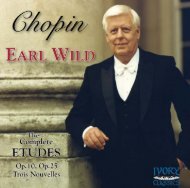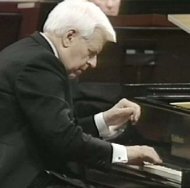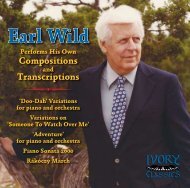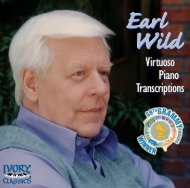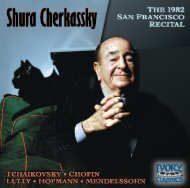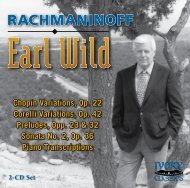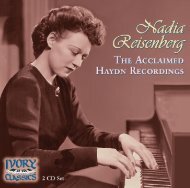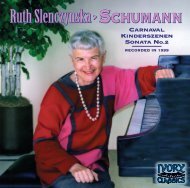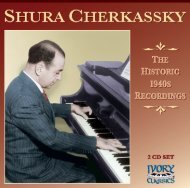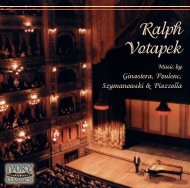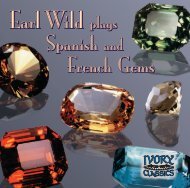Earl Wild Goes To The Movies - Ivory Classics
Earl Wild Goes To The Movies - Ivory Classics
Earl Wild Goes To The Movies - Ivory Classics
Create successful ePaper yourself
Turn your PDF publications into a flip-book with our unique Google optimized e-Paper software.
<strong>Earl</strong> <strong>Wild</strong> <strong>Goes</strong> <strong>To</strong> <strong>The</strong> <strong>Movies</strong><br />
Music by Rodgers/<strong>Wild</strong>, Rózsa, Liszt, Chopin, Steiner, and Mozart<br />
Music on the screen can seek out and intensify the inner thoughts of the characters.<br />
It can invest a scene with terror, grandeur, gaiety or misery. It often lifts mere dialogue<br />
into the realm of poetry. It is the communicating link between screen and audience,<br />
reaching out and enveloping all into one single experience.<br />
— Bernard Herrmann<br />
Although it can be argued that music written for films serves a utilitarian or cosmetic<br />
role – largely as continuity or support of the visual – there is much film music<br />
that outlives the film it was written for. As the history of film has evolved, so has the<br />
history of film music. From the primitive days of pianistic improvisation for silent<br />
cinema to today’s extraordinary and complex scores, audiences have been regaled<br />
by musical creativity of astonishing proportions. Some of the greatest classical composers<br />
wrote film scores – Sergei Prokofiev, Ralph Vaughan Williams, William<br />
Walton, Dmitri Shostakovich, Aram Khachaturian, Arthur Honegger, <strong>To</strong>ru Takemitsu,<br />
Virgil Thomson, Darius Milhaud and Aaron Copland. Hollywood also created a status<br />
and prestige to film composing, generating a formidable group of musicians who<br />
are largely know today for their extraordinary cinematic scores. <strong>The</strong>se include Erich<br />
Wolfgang Korngold, Alfred Newman, Franz Waxman, Dimitri Tiomkin, Bernard<br />
Herrmann, Alex North, Elmer Bernstein, Leonard Rosenman, Roy Webb, Max Steiner<br />
and Miklós Rózsa. In most cases, these composers lived a double life – their<br />
Hollywood or cinematic career, and their concert hall and stage career, creating<br />
music in both arenas. <strong>Earl</strong> <strong>Wild</strong>’s program of piano concerti from the cinema, features<br />
three works written expressly for the screen and three works adapted from the<br />
concert stage as part of the films’ tapestries.<br />
Richard Rodgers (1902-1979) is largely remembered today for his fabulous musicals<br />
(in collaboration with Oscar Hammerstein II and Lorenz Hart): Babes in Arms<br />
(1937), Pal Joey (1940), Oklahoma! (1943), Carousel (1945), South Pacific (1949), <strong>The</strong><br />
King and I (1951) and <strong>The</strong> Sound of Music (1959). On Your <strong>To</strong>es (1936), based on the<br />
– 2 –




